Beacon Hill Roll Call: Nov. 27 to Dec. 1, 2023
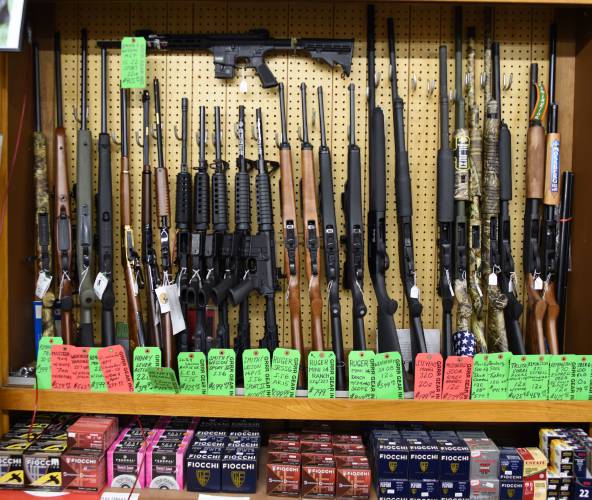
The Legislature’s Public Safety and Homeland Security Committee held a hearing on several bills dealing with guns last week. STAFF FILE PHOTO/PAUL FRANZ
| Published: 12-08-2023 2:21 PM |
There were no roll call votes in the House or Senate last week. This week, Beacon Hill Roll Call reports local representatives’ roll call attendance records for the 2023 session through Dec. 1.
The House has held 70 roll calls so far in 2023. Beacon Hill Roll Call tabulates the number of roll calls on which each representative was present and voting, and then calculates that number as a percentage of the total roll call votes held. That percentage is the number referred to as the roll call attendance record.
In the House, 70.6% (113 representatives out of 160) did not miss any roll calls and have 100% roll call attendance records, while 29.4% (47 representatives out of 160) have missed one or more roll calls.
There were 13 representatives who missed eight or more roll calls resulting in roll call attendance records below 90%. The four representatives who missed the most roll calls are Reps. Michelle Ciccolo, D-Lexington, Richard Haggerty, D-Woburn, Daniel Hunt, D-Dorchester, and Joan Meschino, D-Hull, who each missed 25 roll calls for a 64.2% roll call attendance record.
Rounding out the list of 13 representatives who missed eight or more roll calls are the following: Reps. Tram Nguyen, D-Andover, who missed 23 roll calls (67.1% roll call attendance record); Mary Keefe, D-Worcester, who missed 13 roll calls (81.4% roll call attendance record); Kenneth Gordon, D-Bedford, and Chynah Tyler, D-Roxbury, who each missed 12 roll calls (82.8% roll call attendance record); Tricia Farley-Bouvier, D-Pittsfield, Adam Scanlon, D-North Attleborough, Kim Ferguson, R-Holden, and Fred Barrows, R-Mansfield, who each missed nine roll calls (87.1% roll call attendance record); and Margaret Scarsdale, D-Pepperell, who missed eight roll calls (88.5% roll call attendance record.
Beacon Hill Roll Call contacted the 13 representatives to ask why they missed some roll calls. Only five of the 13 responded. The other eight were contacted three times but did not respond. The list of non-respondents consists of Reps. Nguyen, Keefe, Gordon, Tyler, Farley-Bouvier, Scanlon, Ferguson and Barrows.
Here are the responses:
Rep. Hunt: “Up until this date I have not missed a roll call. Last minute, I had to go get my child from day care because they had a fever. I’ve previously voted in favor of the budget line items and the tax proposal.”
Article continues after...
Yesterday's Most Read Articles
 Greenfield homicide victim to be memorialized in Pittsfield
Greenfield homicide victim to be memorialized in Pittsfield
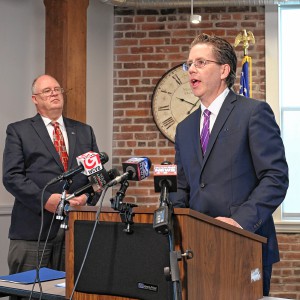 1989 homicide victim found in Warwick ID’d through genetic testing, but some mysteries remain
1989 homicide victim found in Warwick ID’d through genetic testing, but some mysteries remain
 As I See It: Between Israel and Palestine: Which side should we be on, and why?
As I See It: Between Israel and Palestine: Which side should we be on, and why?
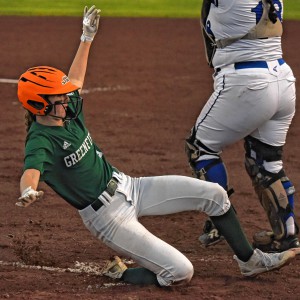 Softball: Greenfield puts up 9-spot in the 8th inning to knock off rival Turners 11-2 in extra-inning thriller (PHOTOS)
Softball: Greenfield puts up 9-spot in the 8th inning to knock off rival Turners 11-2 in extra-inning thriller (PHOTOS)
 DA to announce breakthrough in 1989 unsolved homicide in Warwick
DA to announce breakthrough in 1989 unsolved homicide in Warwick
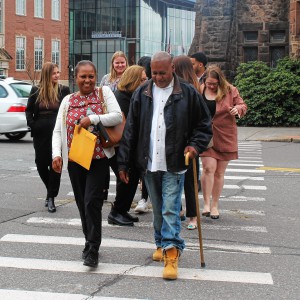 Former Greenfield man granted new trial after 1995 murder conviction, walks free
Former Greenfield man granted new trial after 1995 murder conviction, walks free
Rep. Scarsdale: “On Sept. 27 I had to leave the chamber subsequent to roll call No. 49 due to a preplanned meeting with first responders in my district. This is the only day I have left the chamber during roll call votes during my tenure. I therefore missed roll calls No. 50 through No. 57. [Acting] Speaker Alice Peisch made a statement on the floor reflecting the reason I had to leave, and the fact that had I been present I would have voted in the affirmative for all eight of those roll calls, and this statement is recorded in the House Journal for the day. All eight of those votes resulted in an affirmative outcome either unanimously or by a substantial margin.”
Rep. Haggerty: “I missed a single day of voting this session on Sept. 27, 2023, when I was unfortunately not able to attend a session due to a family commitment. The first roll call vote was for the tax relief legislation, which I had previously voted in favor of, and I would have voted in favor of again. The remaining procedural votes were overrides of the governor’s budget vetoes, which were budget items I had previously voted in favor of. I would have voted in favor of each of those as well.”
Rep. Ciccolo: “This session, I was away from the House chamber during [a] formal session on a single day, Sept. 27, to attend a work-related conference at which I was learning about single-use plastic reduction strategies through reuse and refill. This was the day the budget overrides were being taken up and H 4104 was being enacted. There were an unusually high number of roll call votes on that single day. Fortunately, the vast majority of the items voted on were items on which I had previously voted during the budget and during H 4104’s original engrossment, so my record in the affirmative on these matters should be clear.”
Rep. Meschino: “I was traveling internationally in September when the House scheduled a formal session. I made the commitment well over 15 months earlier. I had no way to know [what] the session schedule would be. The House voted [for] two conference committee reports and a series of budget veto overrides. I only missed the one day of formal session, but the House took up quite a few votes that day.”
The percentage listed next to the representative’s name is the percentage of roll call votes on which the representative voted. The number in parentheses represents the number of roll calls that he or she missed.
Rep. Natalie Blais — 100% (0)
Rep. Aaron Saunders — 100% (0)
Rep. Susannah Whipps — 100% (0)
The State Administration and Regulatory Oversight Committee held a hearing on a proposal that would prohibit the state, the MBTA and cities and towns from constructing “hostile architecture” that supporters of the ban say targets the homeless and tries to push them out of certain areas. The bill defines hostile architecture as “any building or structure that is designed or intended to prevent unhoused individuals from sitting or lying on the building or structure at street level.”
According to Robert Rosenberger, an associate professor of philosophy at Georgia Institute of Technology who has studied and written extensively on the subject, hostile architecture includes armrests that divide benches so that the bench is not long enough to sleep on, sprinklers that are turned on at night and certain trash cans.
“Garbage cans … serve several functions for people living unhoused,” Rosenberger said. “Some people use garbage cans as a source of recyclable materials, [which] can often be exchanged for a small sum of money. Garbage cans are also sometimes approached as a source of discarded food.”
He notes that many newer garbage cans are built so that people cannot reach inside them to obtain recycled bottles or cans or leftover food.
Supporters say that family homelessness in Greater Boston has doubled over the last decade, shelters are overcrowded and waiting lists for affordable housing are in the tens of thousands. They note that policies that sterilize the homelessness crisis in public spaces are not only inhumane, but they also only serve to mask the problem.
“Housing ought to be a human right and combating homelessness will require a comprehensive approach that includes housing production, tenant protections and bigger investments in affordability and services,” said sponsor Rep. Mike Connolly, D-Cambridge. “What will not work is designing public spaces that are hostile to unhoused people. This only sends the issue deeper into the shadows.”
Another measure heard by the State Administration and Regulatory Oversight Committee would ban municipalities and the state from installing or subsidizing new artificial turf fields that contain zinc, plastic, perfluoroalkyl and polyfluoroalkyl substances (PFAS), or other toxins. It would not affect current turf fields, which would be grandfathered in under the bill, but it would assure that no new public artificial turf construction would take place.
“Based on the growing body of evidence that shows that these turf fields pose a danger for athletes from heat stress, severe abrasions and toxic chemical exposure, and cause substantial environmental harm to the local environment,” said sponsor Rep. Carmine Gentile, D-Sudbury. “These concerns have led the U.S. Men and Women’s soccer teams to stop playing on turf, and have compelled towns and cities, including Boston, to issue moratoriums on new turf construction.”
The Public Safety and Homeland Security Committee held a hearing on several bills dealing with guns, including these three:
Ghost guns (S 1496): Would make ghost guns illegal in Massachusetts.
Sponsor Sen. Cindy Creem, D-Newton, explains that ghost guns are unfinished firearms that allow individuals to easily build their own guns from unregulated kits.
“Once constructed, these firearms are unserialized and untraceable,” she said. “To address this loophole, this bill would make it illegal to manufacture, sell or purchase any firearm without a valid serial number, which would include the unfinished frames and receivers. In addition, this bill would make it illegal to manufacture, or 3-D print, firearms without a license.
“I filed this legislation, because although Massachusetts has some of the strongest gun laws in the country, these laws are being undermined by the proliferation and availability of these untraceable ghost guns,” Creem added. “We cannot sit idly by as people continue to exploit this loophole to skirt our state’s firearms regulations and contribute to gun violence across the commonwealth.”
Cannot confiscate legal guns (S 1513): Would prohibit police, other law enforcement officers and other government officials from confiscating any lawfully owned firearm, rifle, shotgun, machine-gun or ammunition. A civil fine of between $500 and $5,000 or up to a 2½-year prison sentence would be imposed for each confiscated weapon. The legislation does not prohibit the confiscation of a firearm from any person who has been placed under arrest, is the subject of a protection order or has had their firearm identification card or license to carry revoked or suspended.
“I filed this legislation to provide lawful Massachusetts gun owners an extra guarantee of their Second Amendment rights,” said sponsor Sen. Ryan Fattman, R-Sutton. “This bill would make it unlawful for police or other government officials acting on behalf of the commonwealth to seize legally owned weapons in the event that a state of emergency is declared in the commonwealth.”
Raise the age for gun possession (H 2369): Would raise the minimum age for acquiring a firearm identification card (FID) from 18 years old (or 14-17 years of age with parental consent) to 21 years old. An FID permits the purchase, possession and transportation of non-large-capacity rifles, shotguns and ammunition.
“So much of gun violence can be attributed to accidents that occur with minors,” said sponsor Rep. David Linsky, D-Natick. “My hope is that everyone who has an FID card is responsible enough to own a firearm, and that starts with being of the appropriate age and maturity.”

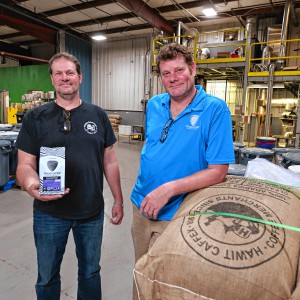 Fogbuster Coffee Works, formerly Pierce Brothers, celebrating 30 years in business
Fogbuster Coffee Works, formerly Pierce Brothers, celebrating 30 years in business Doors open at Tilton Library’s temporary home at South Deerfield Congregational Church
Doors open at Tilton Library’s temporary home at South Deerfield Congregational Church
